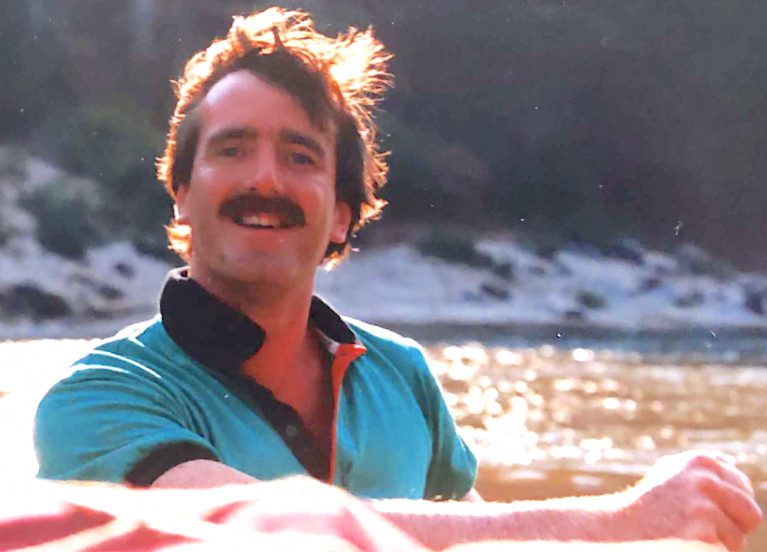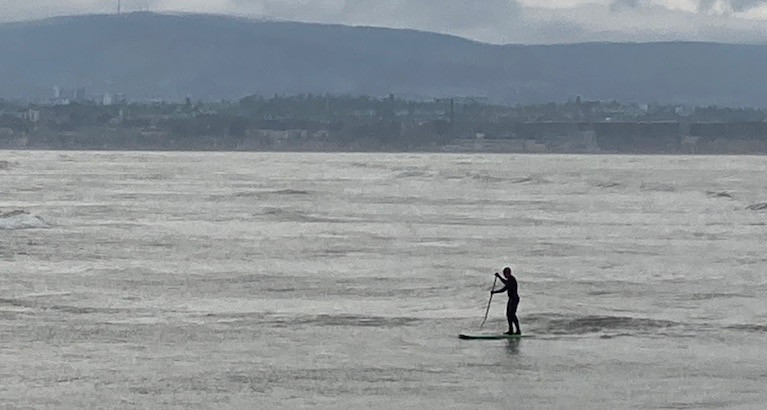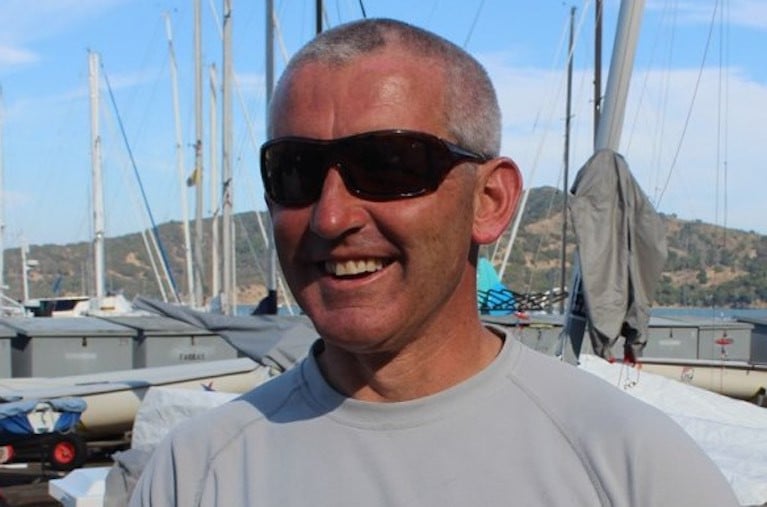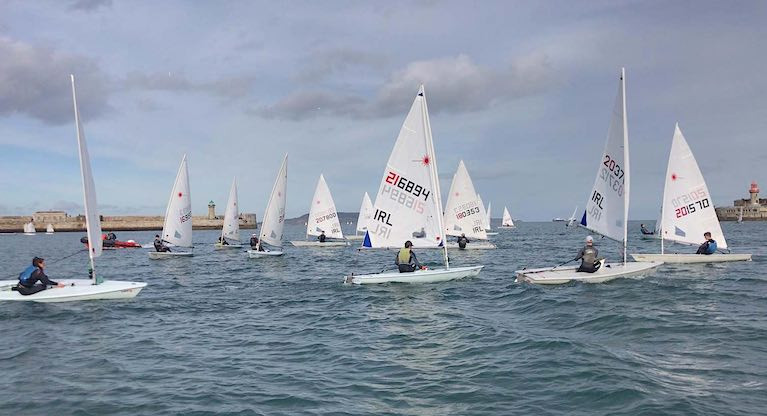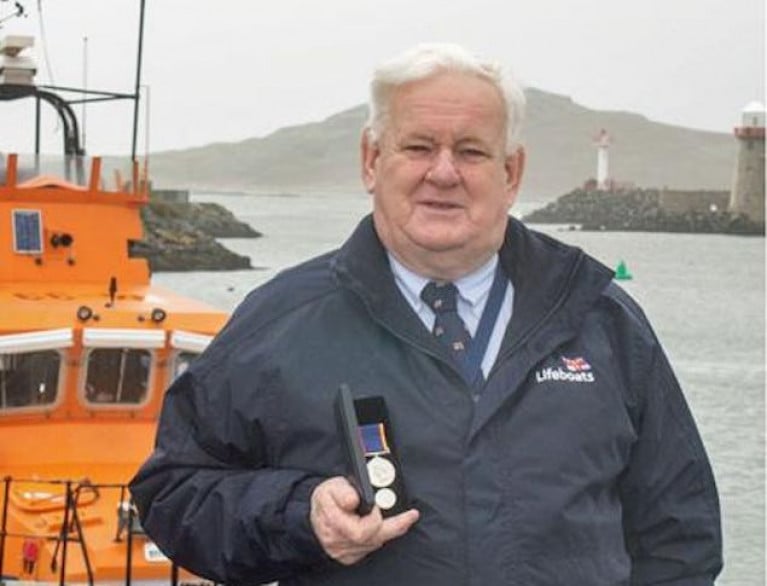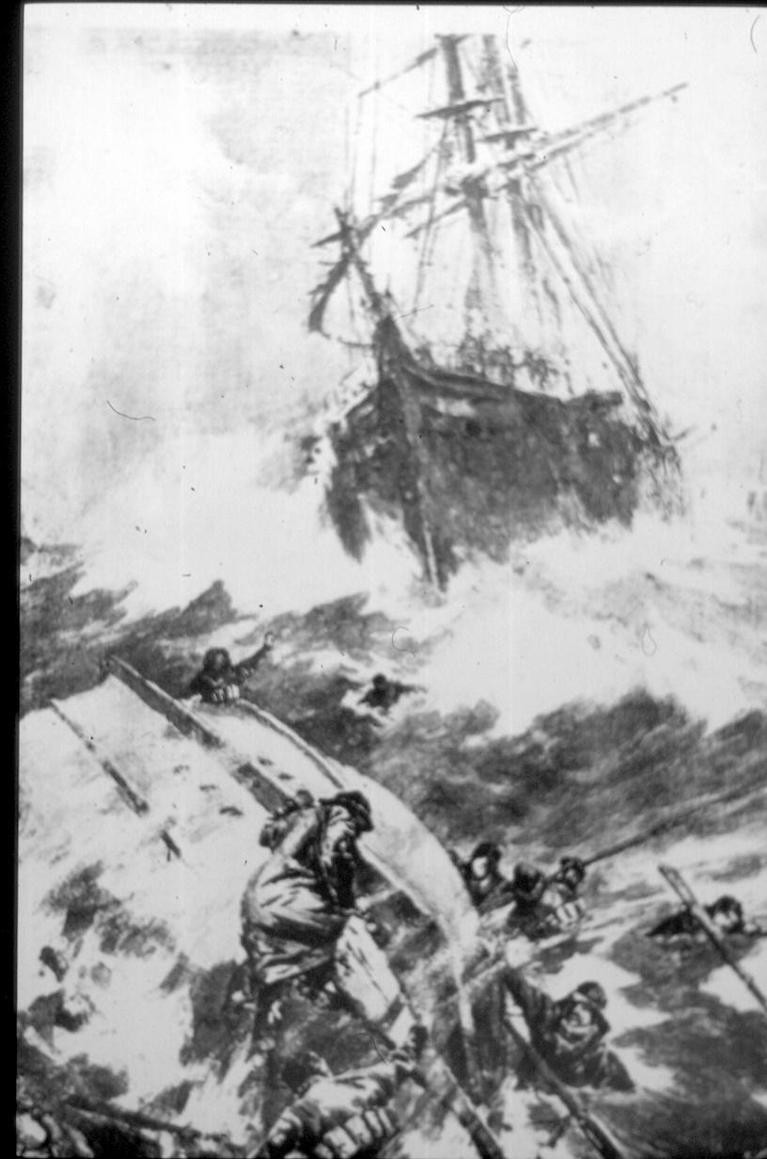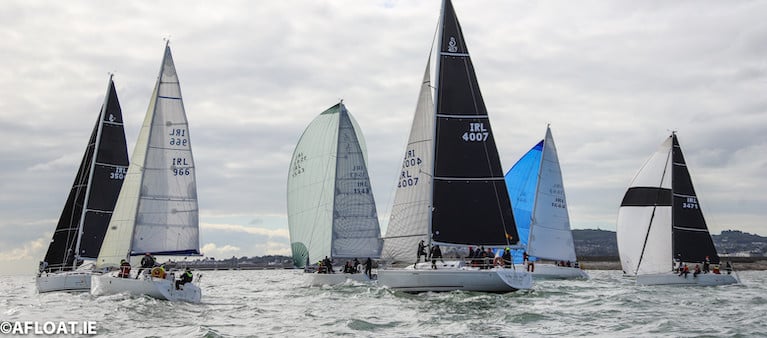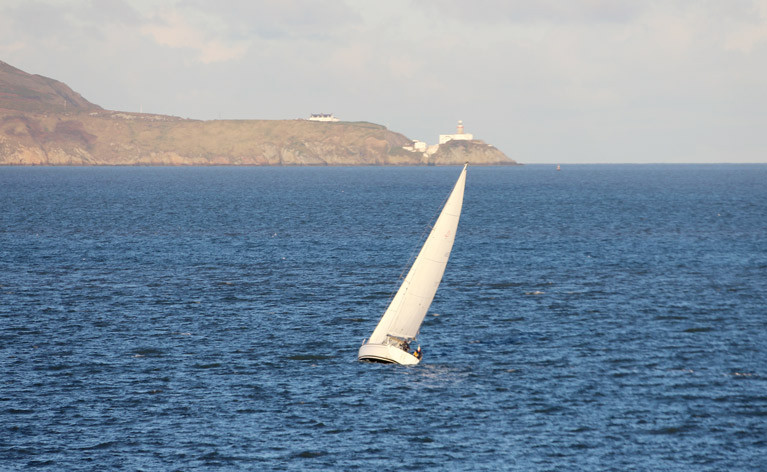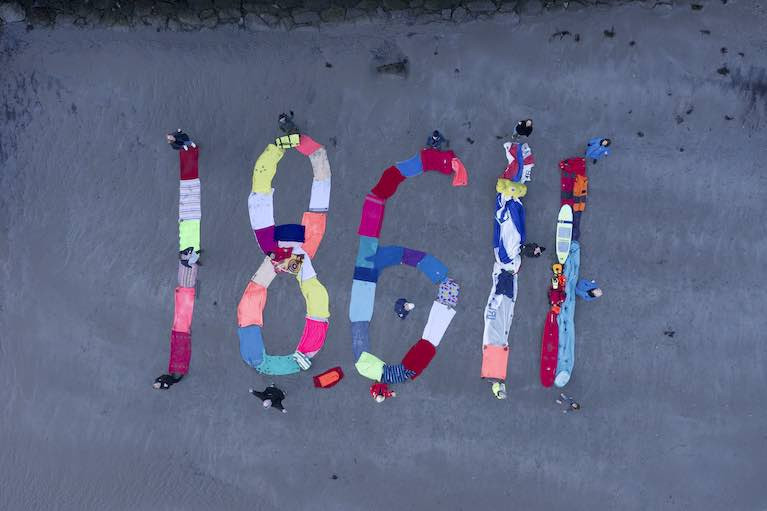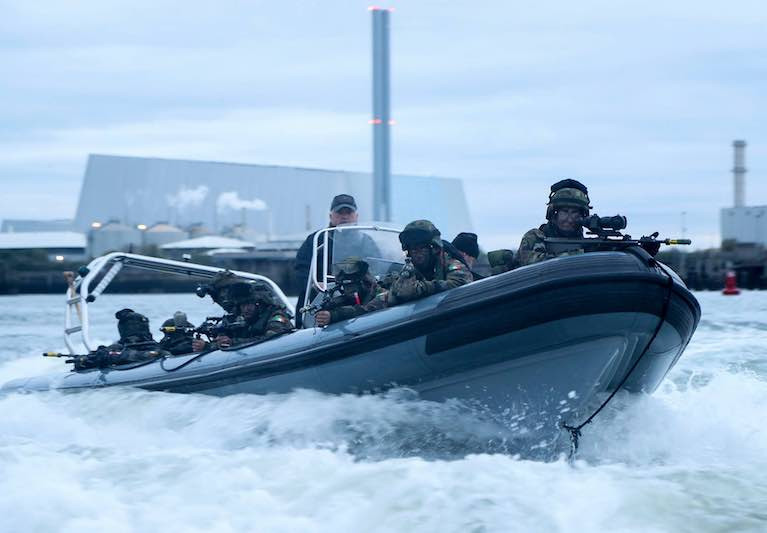Displaying items by tag: Dublin Bay
Jimmy Fitzpatrick 1957-2021
One of Dublin Bay's great sailing characters Jimmy Fitzpatrick of the Royal Irish Yacht Club has sadly passed away.
A true corinthian of sailing Jimmy Fitz was very well known both here and abroad. While he sailed out of the Royal Irish, he could be spotted most seasons holding court on the balconies of all the waterfront clubs. He was on first-name terms with everyone. All who met or sailed with Jimmy would agree that a friendlier, considerate or more entertaining companion was hard to find. He had a deep raucous laugh that was not easily missed.
In honour of Jimmy's life, the flags of each of the Royal Irish Yacht Club, the Royal St. George Yacht Club and the National Yacht Club were flown at half-mast on the day of his funeral last Thursday, January 28.
Like many, he was bitten by the bug when introduced to sailing at the age of seven by his brother Richard. Jimmy later became a head instructor with the Royal Irish and the Royal St George and also instructed in the National Yacht Club alongside current Dublin Bay Sailing Club Commodore Ann Kirwan.
He attended the 50th-anniversary dinner of the N.Y.C. junior section organised by Carmel Winkelmann, where many stories of regattas in Mount Shannon and Rosslare were regaled. Jimmy was very much the Rodney Marsh of sailing, moments of brilliance on the water while partying hard onshore. He knew what it was like to cross the line first in a Dragon Gold Cup race. Win a Wednesday night Wag race. In the Fireball Nationals in Sligo in the early 80s, he beat Adrian and Maeve Bell to a race gun.
 Jimmy Fitzpatrick at the helm of his Fireball on Dublin Bay (with Michael Blaney on the wire) in the 1980s
Jimmy Fitzpatrick at the helm of his Fireball on Dublin Bay (with Michael Blaney on the wire) in the 1980s
At the time the Bells were in the top three in the world, on crossing the line Jimmy jumped overboard to celebrate and later that night the husband and wife duo magnanimously presented Jimmy and crew Mick Blaney with a bottle of Champagne. Years later, Jimmy and Mick nearly divorced when Jimmy simultaneously put the mast through the floor of the boat and his dad's garage roof in a late post regatta parking manoeuvre. Jimmy co-skippered alongside Mark Mansfield, a boat sponsored by his employers AIB in the 1988 Round Ireland Race. In 2004, Jimmy's nephew Rory represented Ireland at the Olympics in Greece. Jimmy worked hard behind the scenes to help Rory gather funds for the campaign to get him qualified.
It was when Jimmy got to UCD that his real passion in sailing developed; it was Team Racing. Jimmy competed in hundreds of team racing events over the years. He won the colours match for U.C.D. three years in a row setting the platform for the Rhinos (Spike, Joe Blaney & Marto Byrne) to go win it for another three years after that. In the '80s Jimmy moved to London and his flat became a focal point for not only Irish team racers but all the UK teams. He guest-helmed for the Nottingham Outlaws at the Illingworth trophy organised by HMRN. At the time the Outlaws were one of the top teams in the UK He set up his own team of sailors based in London and called them the Wild Geese. It was never clear what the criteria for qualification were but an ability to party was essential. Jimmy even managed to get a few West Kirby sailors to sail with the Wild Geese when short on numbers.
While competing at the Wilson Trophy one year, West Kirby had decided to try something different and hired a top sports commentator from Radio Liverpool to do some commentary on the team racing on the lake. They even installed a stand beside the caravan where the commentator was based. After a few hours, not even one man and his dog was watching or listening to what was unfolding and to make matters worse, the poor commentator knew nothing about sailing. Toll Smith a grandee of WKSC saddled up to Jimmy who was holding court in the wet bar and asked if he would mind spending a few minutes with the commentator to give him a few pointers on the sport. After a short conversation, the commentator from Liverpool Radio suggested to Jimmy he has a go at commentating on the next race. He passed the microphone to Jimmy and as they say the rest is history. Four hours later, Jimmy emerged from the caravan to a standing ovation from a full stand and a big crowd all around the lake. Jimmy later went on to commentate on the team racing worlds held in the Royal St.George, on the Sydney Olympics with RTE and was also invited to commentate with Sky Sports on a fledging International 14ft circuit.
Team racing appealed to Jimmy because he loved the camaraderie and people loved being in his company. He was very involved in the hearings on whether Commercial Cruise Ships should be allowed enter Dun Laoghaire Harbour. In the last decade, Jimmy struggled with his mental health, and many in the sailing community did their best to help him through difficult times.
 Jimmy Fitzpatrick (third from right) sailing on Mick Blaney's (standing) 31.7 in the 2019 Volvo Dun Laoghaire Regatta Photo: Afloat
Jimmy Fitzpatrick (third from right) sailing on Mick Blaney's (standing) 31.7 in the 2019 Volvo Dun Laoghaire Regatta Photo: Afloat
Jimmy still managed to compete with Mick Blaney on his Beneteau 31.7 right up till racing was cancelled last July. Despite the pressures, he was going through his ability to spot a wind shift never left him. Jimmy would have been the first to point out that when we sail, we always take precautions for our own safety and that of our crew. So onshore let's not forget to take care of our mental safety and that of our friends.
 Jimmy Fitzpatrick in his role as race officer for the Water Wags on Lough Boderg
Jimmy Fitzpatrick in his role as race officer for the Water Wags on Lough Boderg
Team racing and Dublin Bay will be the poorer for the loss of the unbridled enthusiasm of Jimmy Fitz. He only had one speed, and that was full-on.
Fair winds my friend.
DS
More photo memories of Jimmy have been provided by his friends and family here
SUP Surfing at the Shelley Banks on Dublin Bay
Saturday's strong northeasterly winds that kicked up such a storm in the south of Dublin Bay (as our photos of the Dun Laoghaire baths site showed) also presented some ideal surf conditions for Stand Up Paddleboarders (SUPs) in the north-west of the Bay at the Shelley Banks at the Irishtown nature reserve.
Afloat reader Colm Boland sent us the images of a paddleboarder enjoying the wind and the waves in the capital's waters at the weekend.
As Afloat reported in 2018, there can also be some good wave action in the north of the Bay at Dollymount Beach depending on wind direction and the arrival times of the cross channel ferries.
Full House for Prof’s Top Ten Dublin Bay Racing Tips at Royal Irish Yacht Club Webinar
North Sails Ireland’s Maurice “Prof” O’Connell’s top ten tips talk to RIYC Members and guests pulled in the crowds with a record-breaking 105 attending.
Prof’s insights for racing in Dublin Bay ranged on how to gain maximum advantage through adequate preparation before going afloat, through to the start line to sail trim principles/set-up and key boat handling manoeuvres for rounding marks.
Prof brought the audience through Dublin Bay geography and topography, the DBSC course card design, logic, mark locations and geometry as well as Dublin Bay currents.
He talked through the importance of correct onboard communications and providing clear information fundamental to sailing the correct course.
Prof, who never misses a DBSC race with his customers unless he is out of the country, concluded with “Rules of Thumb” for Dublin Bay racers. The talk was part of the RIYC “Home Together” series of virtual talks.
Dublin Bay Laser Dinghy Fleet Plans Another Record Season
2020 was a record season for the Dublin Bay Laser Class, and by all accounts, they’re expecting an even bigger season in 2021.
While continuous sailing has been difficult for all fleets since the start of the pandemic, the single-handed Laser fleet has fared better than most, and as a result, its popularity has surged. For the 2020 Dublin Bay Sailing Club (DBSC) summer series, the Laser had the highest number of entries compared with any other fleet, with over 90 boats registered. Entries were split across the Standard, Radial and 4.7 rigs with both adult and junior sailors taking part.
Lasers are proving to be a very versatile boat, especially in these turbulent times. Local active sailors range in age from teenagers as young as 13 right through to adults in their 50s and 60s. The fleet is also very well balanced between female and male sailors with both genders across the ages competing as equals, particularly in the Radial and 4.7 rigs.
"with the constant changes in COVID restrictions, the Laser is providing a more consistent sailing experience"
Local class captain Brendan Hughes explained why there is an expectation of even bigger numbers in 2021; “We’ve seen interest in the fleet continue to grow especially amongst adults. Many of these already sail cruisers but with the constant changes in restrictions, the Laser is providing a more consistent sailing experience. We’re the only large fleet that has been able to get out on the water in nearly all levels of lockdown.”
As a competitive single-hander, Hughes acknowledges that the Laser can be perceived by some as a challenging boat to sail. “In 20 knots, the Laser can be a challenge for sure! However, there has been a lot of effort put into training across Dun Laoghaire. Right throughout the year, there is coaching taking place for beginners and competitive sailors at both junior and adult level.” The increase in coaching availability over the past number of years is acknowledged by many new sailors as being critical in making this class more accessible.
 Dublin Bay's new Laser dinghy Class Captain Brendan Hughes
Dublin Bay's new Laser dinghy Class Captain Brendan Hughes
In addition, constant adjustments to racing formats have helped to ensure the Laser fleet remains vibrant. During 2020, the DBSC dinghy race officers introduced Saturday racing in addition to Tuesday evening racing for the Laser fleet. This proved to be extremely popular and the Laser fleet was eager to see this continued in 2021. The club has confirmed that the format will continue for the new season of the AIB DBSC Summer Series with the entry fee covering both Tuesdays and Saturdays for all sailors.
A number of headline events in 2021 taking place in Dublin Bay are expected to drive continued interest from new sailors. The Irish Laser Master Nationals event will be hosted in Dun Laoghaire’s Royal St George Yacht Club from 12th -13th June. This event is open to all sailors over the age of 35 and the organisers expect to have 50+ boats from across the country participate.
A recent survey of local Laser sailors revealed that over 120 boats intend to participate in the Volvo Dun Laoghaire Regatta One Design Championship taking place 2nd - 4th July. “If even two-thirds of that number participate in this new format, it would be the largest one-design fleet on the water at this year’s event, which is very exciting.” says Hughes.
August sees the International Laser Class Association (ILCA) 4.7 World Championship coming to Dublin Bay. Local organisers are expecting several hundred youth sailors from across the globe to participate in this event. This event will be one of the biggest sailing events to take place in Ireland this year and is a great opportunity for our younger sailors to participate on the world stage.
Afloat also hears that planning has begun amongst the Masters fleet to send a delegation to Malta in November. EurILCA, the European Laser organisation is holding its Euro Masters Regatta at Royal Malta Yacht Club from 4th - 7th November.
With a mix of local, national and international Laser events taking place in Dublin Bay this summer, it sounds like another big year for the fleet. More information on Laser sailing in Dun Laoghaire is available by emailing [email protected]
Howth Lifeboat Station’s John McKenna Awarded RNLI Long Service Medal
Howth Lifeboat Station Community Safety Officer John McKenna has been awarded a long service medal by the RNLI.
In 2020, McKenna (73) reached a milestone: 21 years of volunteering for the RNLI and saving lives at sea.
He has been telling the RNLI’s own magazine about his decision to join the RNLI in the first place, his role and how influencing people’s behaviour can be a skilful and powerful tool in lifesaving.
John works as part of a team of six in the Community Safety Team at Howth, one fo Ireland’s busiest stations.
“We all work together to educate and give free water safety advice to everyone who visits the coast in our local communities, from walkers to sailors. As the Community Safety Officer, I lead and help coordinate the team, he told the magazine.
Every lifeboat station has a Community Lifesaving Plan which identifies the most popular water activities within a community so that volunteers like me can give relevant water safety advice to those most at risk.
John told the RNLI “ I was at sea in a big cargo ship on the night of 9 December 1981 when the Penlee lifeboat Solomon Browne and her crew perished. It was one hell of a night. We made a collection from all onboard and sent it to Penlee. The tragedy also inspired me to become an Offshore RNLI member.
Then 14 years later, on 16 November 1995, I was driving home from Belfast after spending a week on a ferry as senior officer. As I was coming into Howth, I could hear a helicopter. I drove along the harbour and saw the trawler Scarlet Buccaneer being thrown up and down the harbour wall and the lifeboat crew trying to save the fishermen onboard. It was horrendous. There was a full gale blowing. The next day I saw the wreck of the Scarlet Buccaneer in two halves. Thankfully, the lifeboat crew managed to rescue all four fishermen but sadly one died on the way to the hospital. I decided there and then that if I ever got a shore job, I would become an RNLI volunteer.
More of the interview with John McKenna is here
Dublin Bay Old Gaffers Will Show That Worse Things Can Happen at Sea
If you think that life is tough under the current pandemic, then the Dublin Bay Old Gaffers Association has just the thing to put current national and personal problems into perspective, with a comprehensively illustrated Zoom talk by noted maritime historian Cormac Lowth on the tragic Palme Shipwreck and the Dublin Bay Lifeboat Disaster of Christmas 1895.
On Christmas Eve 1895, the sailing ship 'Palme' was wrecked in Dublin Bay. A lifeboat from the Dun Laoghaire Harbour station set to try to rescue the crew of the wrecked ship.
The lifeboat overturned and all fifteen of the crew were lost, with Christmas Eve 2020 being the one hundred and twenty-fifth anniversary of the tragedy. It is essential that we remember the sacrifice of these heroic men in their attempt to save the lives of their fellow seamen, and to appreciate the efforts of lifeboat-men everywhere, who go out - whenever the call arises - to help those who are in peril on the sea.
Cormac F. Lowth with be giving a profusely illustrated and detailed account of the shipwreck and the tragic events that followed on Thursday, January 14th 2021 at 8.0pm – please check-in at 7.30 pm, clicking on this link to join the meeting.
Lifeboat donations can also be made here
Two Early 2021 Dublin Sailing Fixtures Impacted By COVID
Two of 2021's early-season cruiser-racer sailing fixtures on Dublin Bay are up in the air due to January's lockdown restrictions.
A new ISORA 'Early Season Series' originally planned for this month was to continue the offshore's body's successful 2020 coastal racing out of Dun Laoghaire Harbour. However, the current lockdown has put paid to those plans, leaving ISORA boss Peter Ryan to reschedule.
"We had planned for January but that's not going to happen. So, rather than cancel, we will reschedule those races into a potentially tighter programme as soon as possible", Ryan told Afloat.
The 2020 ISORA Coastal Series attracted a dozen or more entries and typically involved a race using virtual marks along the County Dublin and Wicklow coasts.
Ryan's offshore enterprise won him an end of the year gong. The NYC sailor took an Afloat Sailor of the Month Award in December for his success in staging an ISORA series in lockdown in 2020.
DBSC Spring Chicken
Meanwhile, following the total abandonment of its popular Turkey Shoot pre-Christmas event, the hope is that Dublin Bay Sailing Club will be in a position to run its Spring Chicken Series that starts traditionally in the first week of February.
The series of six races are held on Sunday mornings and organised by DBSC attracting as many as 40 boats.
However, as COVID lockdown restrictions are set to continue nationally until January 30th, fears are that there is now every chance that restrictions could also impact DBSC's spring fixture too.
The popular Spring Chicken format features short, sharp races typically of around one hour in duration.
In a new year announcement, DBSC was named as 2021 Sailing Club of the Year for its achievements in keeping sailing going on Dublin Bay during the lockdown in 2020.
New Year's Day Sails on Dublin Bay
Boaters in the capital's waters celebrated a bright but cold New Year's Day with several sailing cruisers taking a tack on Dublin Bay yesterday, empty except for three or four Dublin Port bound cargo ships moored in the southern bay anchorages.
There was some small dinghy activity too in and around Dun Laoghaire Harbour with a number of single-handed Laser sailors enjoying the chilly but good sailing breeze of ten to fifteen knots.
Motorboats, including several RIBs and smaller sized runabouts, also took advantage of the winter sunshine and headed south from Dun Laoghaire Marina to nearby Dalkey Island for a quick spin, passing a steady stream of sea swimmers at the Forty-foot bathing place.
Boating Lockdown
New Level 5 COVID-19 lockdown measures mean all organised sailing activity nationwide has been stopped.
In Dun Laoghaire, this led to the cancellation of DMYC's Christmas Cracker event and even January's RS Aero training at the National Yacht Club has been scrubbed in line with Government guidelines.
Elite sport, however, is permitted and in sailing's case this is based at the Irish Sailing's High-Performance HQ but it is unclear how much training there will be at Dun Laoghaire with some of the squad scheduled for a critical winter camp in Portugal.
Live Dublin Bay webcam here
Swimmers 'Towelling Inferno' Protest Over Dublin Bay Water Quality
A “giant-size” towel collage has been spread out at Blackrock’s Seapoint shoreline in Dublin Bay on Saturday to highlight the need for action over Dublin Bay water quality.
Open water swimmers suspended hostilities over whether dry robes or towels were more socially acceptable to participate in the peaceful initiative - at a social distance.
SOS Dublin Bay, which organised the gesture, is calling for increased testing of bathing water quality.
It is seeking real-time reporting of results “in recognition of all-year-round bathing which has become more common in Dublin”.
SOS Dublin Bay chairman Gerry Jones said record numbers of people were now swimming in the bay all year round.
He said that “local authorities need to recognise this reality by ensuring that bathing water quality readings are provided on an ongoing basis to the general public”.
He said there should be regular publication of all appropriate public health guidance particularly when the water is polluted.
“Thousands of people are now taking to the waters in Dublin Bay every day, yet we are simultaneously witnessing the appalling spectacle of raw sewage being dumped into the bay at Ringsend after heavy periods of rainfall,” he said.
 A scene at the Forty Foot bathing place at the southern tip of Dublin Bay during Winter 2020
A scene at the Forty Foot bathing place at the southern tip of Dublin Bay during Winter 2020
“We can’t put people’s health on hold while we wait for a promised upgrade of the Ringsend sewage treatment plant which won’t happen till at least 2025,” he said.
There are “ creative interim solutions” at to prevent Irish Water dumping sewage into the Liffey estuary and onward into the bay, he said, and SOS Dublin Bay aims to publish several proposals in the new year.
The Environmental Protection Agency (EPA) has acknowledged the risks to water quality after periods of heavy rainfall which result in overflow from storm drains and from the Ringsend sewage treatment plant, among other sources.
Rainwater run off at Sandycove Point on Dublin Bay from Afloat Magazine on Vimeo.
However, it says it is awaiting a review of the EU Bathing Water Quality directive before recommending any legislative changes to allow for greater frequency of , and more detailed scope of, testing here.
Under current regulations, local authorities are only required to test bathing water quality once a month between May and September. Some local authorities test more frequently, but results are slow.
The tests under the EU bathing water quality directive are limited to E.coli (EC) and Intestinal enterococci (IE), based on World Health Organisation research.
 Dublin Bay swimmers call a truce in Dry Robe wars and lay out their towels in support of a cleaner Dublin Bay - 18611 is the current number of signatures to the online petition for a cleaner bay Photo: One minute forty
Dublin Bay swimmers call a truce in Dry Robe wars and lay out their towels in support of a cleaner Dublin Bay - 18611 is the current number of signatures to the online petition for a cleaner bay Photo: One minute forty
University College Dublin (UCD) microbiologist Prof Wim Meijer explains that most E.coli are harmless.
However, VeroToxigenic E coli strains, contracted from ingesting water contaminated with animal faeces or from undercooked meat or contaminated salads, produce a powerful toxin which can cause “a range of symptoms, from bloody diarrhoea to kidney failure and may cause fatalities”
Prof Dearbháile Morris, director of NUI Galway (NUIG) Ryan Institute’s Centre for One Health, said current testing systems are outdated, as they only look for the total number of e-coli in a 100ml sample and not the detail.
A system for live bathing water monitoring named EU SWIM is at an advance stage, co-ordinated by UCD computer scientist Prof Gregory O’Hare and involving Prof Meijer.
The SOS petition is here
Irish Defence Forces To Carry Out Military Exercise in Dublin Docks
The Irish Defence Forces say they will be conducting a military exercise in the Poolbeg area of Dublin Docks tomorrow morning between 6 & 9.00 am
The exercise aims to test junior leaders in a Military Operations in Urban Terrain (MOUT) environment & will involve low flying helicopters, boats & pyrotechnics.
The 'public notice' was posted via the Defence Forces Facebook page.



























